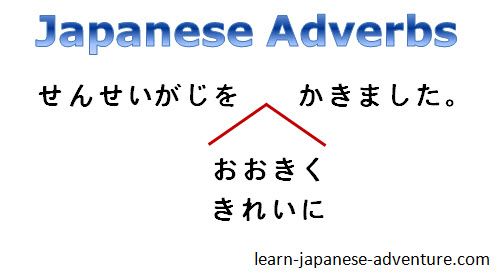- Home
- Basic Lessons
- Japanese Adverbs
Learning Japanese Adverbs -
Free Japanese Lessons: 25
There are 2 types of Japanese adverbs 副詞 (fukushi).
One can be formed by making simple change to adjectives. The other type of adverbs consists of some pre-defined characters which do not derived from adjectives.
We all know that in English, adjectives are used to describe nouns and adverbs are used to describe verbs. That's the same in Japanese. For example...
- せんせいが おおきいじ をかきました。
sensei ga ookii ji wo kakimashita
Meaning: Teacher wrote a big word.
...the adjective おおきい (ookii - big) is describing the noun じ (ji - word).
In order to describe the action of the teacher (how she wrote the word), you will need to put in the adverb. Note that Japanese adverbs always come before verbs. Therefore using the above example...
- せんせいがじを おおきく かきました。
sensei ga ji wo ookiku kakimashita
Meaning: Teacher wrote the word with big strokes.
- せんせいがじを きれいに かきました。
sensei ga ji wo kirei ni kakimashita
Meaning: Teacher wrote the word neatly.

In the above 2 examples, the adverbs おおきく (ookiku) and きれいに (kirei ni) are describing the actions of teacher (how she wrote the word).
1. Changing Adjectives to Adverbs
How to change an adjective to an adverb? Since there are 2 types of adjectives (i-adjective and na-adjective), there are 2 different rules governing the change.
i-adjectives: い-adj(~い) く Verb (Action)
na-adjectives: な-adj に Verb (Action)
For i-adjectives, you just need to replace the い (i) in the adjective with く (ku). Whereas for na-adjectives, append the hiragana に (ni) to the adjective.
Let's use some more examples to show how easy to form adverbs using adjectives...
|
1. |
わたしはゆうべうちへ はやく/おそく かえりました。 |
|
2. |
ともだちはいつも はやく/おそく あるきます。 |
|
3. |
せんせいはにほんごを じょうずに はなします。 |
There are 2 meanings for はやい (hayai). It can mean early or fast depending on the context of the sentence. Similarly, おそい (osoi) can mean late or slowly depending on the sentence's context.
2. Regular Japanese Adverbs
The second type of Japanese adverbs is not derived from adjectives. This group of adverbs are regular adverbs which we use frequently in sentences.
I will list some of the most commonly used adverbs with examples.
a. はっきり (hakkiri) - clearly, distinctly
- はっきり せつめいしてください。
hakkiri setsumei shite kudasai
Meaning: Please explain clearly.
b. ゆっくり (yukkuri) - slowly, at ease
- ゆっくり あるきなさい。
yukkuri arukinasai
Meaning: Walk slowly.
c. すこし (sukoshi) - little, few, small quantity
- わたしは すこし つかれています。
watashi wa sukoshi tsukarete imasu
Meaning: I am a little tired.
d. ほとんど (hotondo) - almost, nearly
- わたしは ほとんど まいにちテレビをみています。
watashi wa hotondo mainichi terebi wo mite imasu
Meaning: I am watching tv almost every day.
e. あまり~ない (amari~nai) - not very, not much (used with negative)
- かれは あまり せがたかくない。
kare wa amari se ga takakunai
Meaning: He is not very tall.
f. ぜんぜん~ない (zenzen~nai) - completely, not at all (used with negative)
- かのじょは ぜんぜん おさけをのまない。
kanojo wa zenzen osake wo nomanai
Meaning: She doesn't drink (alcohol) at all.
There are many more regular Japanese adverbs which I will introduce in the Japanese words and vocabulary section.
Take The Challenge Sales! Get 45% OFF Premium & Premium PLUS! Ends on 16 Jan 2026
Click Here to Get 45% OFF Premium & Premium PLUS and be on the fast track to fluency in Japanese.
The link above is an affiliate link, which means that I would earn a commission (at no extra cost to you) if you do end up purchasing the related learning course.
Previous - Lesson 24: Japanese Particles wa and ga
Buy me a coffee









Facebook Comments
Don’t see the comments box? Log in to your Facebook account, give Facebook consent, then return to this page and refresh it.